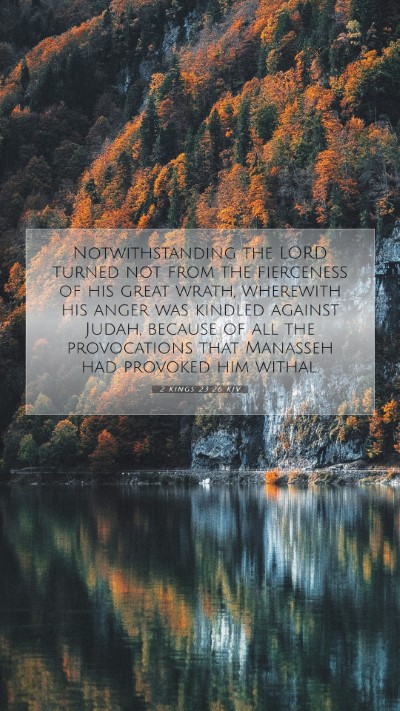Understanding 2 Kings 23:26
Bible Verse: 2 Kings 23:26 - "Notwithstanding, the Lord turned not from the fierceness of his great wrath, wherewith his anger was kindled against Judah, because of all the provocations that Manasseh had provoked him with."
Overview of 2 Kings 23:26
This verse serves as a critical reflection on the consequences of sin in Judah, particularly in light of King Manasseh's actions that brought judgment from God. It illustrates the severity of God's wrath and the depth of Israel's disobedience. The historical context emphasizes the importance of understanding the unfolding narrative of Judah's descent into idolatry and the eventual reforms instituted by King Josiah.
Commentary Insights
In analyzing 2 Kings 23:26 through various public domain commentaries, we glean valuable insights on its significance and implications.
Matthew Henry's Commentary
Matthew Henry emphasizes the unrelenting nature of God's wrath against the continued sin of Judah. He explains that despite Josiah's efforts to reform the nation and restore true worship, the collective guilt accumulated through the reign of Manasseh had led to a judgment that could not be easily reversed. This underlines the principle that sin, when allowed to take root, produces long-term consequences that can affect generations.
Albert Barnes' Commentary
Albert Barnes elaborates on the idea that God's anger was kindled by the provocations of Manasseh. Barnes notes that Manasseh’s deep-rooted idolatry and abominations had established a precedent of rebellion against Yahweh. Although the reforms of Josiah were substantial, they could not completely undo the damage done by previous kings. Barnes stresses the importance of recognizing the cumulative effect of sinful behavior on the spiritual state of a community.
Adam Clarke's Commentary
Adam Clarke offers an eschatological perspective, pointing out that the persistence of God's wrath reflects His holiness and justice. Clarke conveys that while God is patient, His patience has limits, and He will not overlook grievous sin indefinitely. The verse underscores the serious implications of turning away from God and highlights the need for repentance and genuine return to true worship.
Historical Context
To fully appreciate 2 Kings 23:26, it is necessary to consider the historical backdrop of Judah during the reign of Manasseh:
- King Manasseh's Reign: His reign was marked by extreme idolatry and the introduction of pagan practices that angered God.
- Josiah's Reform: Though Josiah attempted to bring about reform, the sins committed during Manasseh’s rule had dire consequences that extended beyond immediate redemption.
- Prophetic Warnings: The warnings from prophets during this time pointed toward the impending judgment due to persistent sin.
Theological Implications
The theological implications of 2 Kings 23:26 extend into various areas of biblical understanding:
- God's Holiness: The verse reflects a crucial attribute of God - His holiness cannot tolerate sin.
- Divine Justice: This emphasizes that God's justice prevails; ultimately, rebellion against God will have repercussions.
- Need for Repentance: It serves as a reminder of the importance of repentance in the face of genuine wrongdoing.
Application for Today
The principles found in 2 Kings 23:26 are not only relevant for ancient Israel but also hold lessons for believers today:
- Awareness of Sin: Understanding the weight that sin carries in both personal and communal contexts.
- Encouragement of Repentance: Advocating for humility and turning back to God when faced with wrongdoing.
- Commitment to Faithfulness: The need for ongoing faithfulness to God to prevent the repetition of historical failings.
Cross References
In studying 2 Kings 23:26, one may also consider several cross-references that enhance our understanding:
- 2 Kings 21:16: A direct account of the abominations committed by Manasseh.
- 2 Chronicles 34:3-7: Chronicles the reforms initiated by Josiah.
- Jeremiah 15:4: Prophecy concerning the impact of Manasseh's actions on Judah.
Conclusion
In conclusion, 2 Kings 23:26 serves as a powerful reminder of the seriousness of sin and the necessity for national and personal repentance. Understanding the fierce anger of God due to Manasseh’s provocations encourages believers to engage in introspection and commitment to spiritual fidelity. Through the insights gathered from commentaries and the historical context provided, readers can gain a deeper understanding of this scripture and its application to contemporary faith lives.


